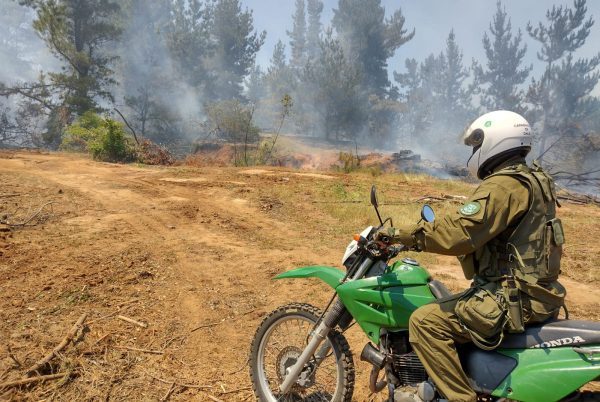In wildfires, the investigative axiom that states "the sooner responders arrive at the scene, the better" holds true. For this reason, the local Public Ministry acknowledges that new technologies, such as the use of drones, have increased the number of arrests and improved the quality of investigations. As soon as a wildfire or stubble fire is detected, drones can quickly reach the site.
Under the same logic, few—if any—institutions in the country can reach the location of a reported fire faster than Carabineros, thanks to their motorized units or all-terrain vehicles. It was this capability that led the regional prefect of Carabineros, Commander Diego Salas, alongside the presidential delegate, Gabriel Pradenas, to introduce the first forest patrol in the uniformed police force’s jurisdiction yesterday in Ñuble.
This unit will be key in improving response times for CONAF (National Forestry Corporation) brigades, enhancing emergency planning by territorial authorities, and initiating potential criminal investigations through the Technology, Information, and Communications (TIC) workshop.
"Our team will also be able to carry out autonomous actions, such as helping residents create firebreaks, evacuating neighbors, and supporting emergency teams by managing traffic and escorting emergency vehicles," added Commander Salas.
The Forest Patrol consists of 12 officers, two from each police station in Ñuble, who will conduct preventive patrols within their jurisdiction. Their duties will also include promoting wildfire prevention, raising awareness among families about emergency actions, and identifying risk factors.
Six government lawsuits
Regarding penalties, prosecutor Rolando Canahuate noted that in the last season, the number of formal charges increased by approximately 30%. He also detailed that existing legislation, such as the Penal Code, includes penalties for intentional arson as a crime, with sentences starting at five years and one day or more.
"For negligent fires under the Forest Law, penalties will depend on the damage caused and the type of negligence, ranging from 541 days to three or five years, depending on the fire's origin—electrical or uncontrolled burning, for example," he warned.
In this context, presidential delegate Gabriel Pradenas stated that the government, through the Delegation, has six active lawsuits for these types of crimes. Additionally, the Labocar (Criminal Investigation Laboratory) is conducting investigations into the five largest fires affecting Ñuble, particularly the Caserío Linares fire, which may soon conclude with formal charges.
Source:www.ladiscusion.cl







Comentarios (0)
No hay comentarios aún. ¡Sé el primero en comentar!
Deja un comentario